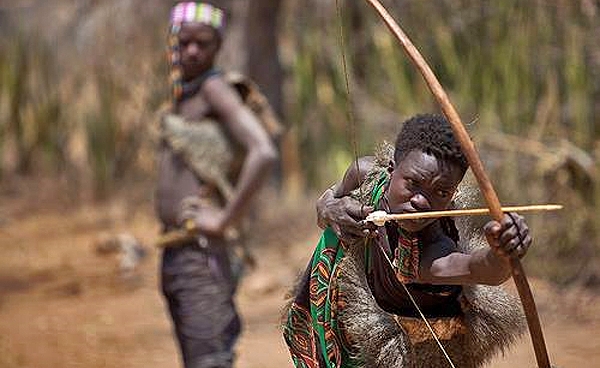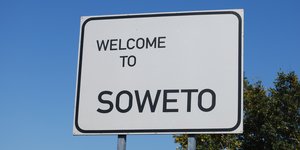Like this article?
Go on, give it a kudu!

Published on January 30 2015
Written by:
Lilian Kramer
4167 views
There are just a handful of hunter-gatherer peoples left on earth today
The Hadza apply their extensive knowledge of plants and wild animals by dividing their labor between foraging and hunting
The Hadza have always lived in clusters in the area around Lake Eyasi Valley, Tanzania
Their diet depends on the seasonal abundance of plants and fruits they forage using digging sticks
Without permanent shelters, livestock or produce, they barely leave a footprint on earth.
I was introduced to the Hadzabe ( 'Hadza,' feminine plural form) tribe in Tanzania while doing some field research in the Serengeti Tanzania following months of teaching in a Maasai village in Kenya. I had no idea what to expect and had trepidations, as I had never met with a hunter-gatherer tribe before. I was joined by my interpreter who knew the tribe well. Since my initial visit, I have returned to visit the Hadza many times as I now bring culturally curious visitors to them.
When I arrived at 6:30 AM, at one of the Hadza communal areas off the beaten path in the East African bush, about 15 young hunters wearing baboon skins were sitting around a campfire preparing for their morning hunt under a huge baobab tree. They motioned for me to join them as they made room for me to join their circle. As they straightened the shafts of their arrows collected from the bush, I was struck by how friendly, gregarious and laid back they were. As they laughed and fooled around with one another in an amicable way, I began to feel more at ease.
Nearby was a group of Hadza women watching their children and sowing animal skins into clothing. A Hadza infant began crying in the women's circle. His mother picked him up, walked over to a branch with small berries and plucked a few and put them in front of her child. After eating it, he immediately became quiet. This is how the approach life. They believe the plants and animals where they have been living for millennia will always be there when they need them.
There are just a handful of hunter-gatherer peoples left on earth today. In addition to the Hadza are the Kalahari / Sans bushmen in Southern Africa and a few communities in the Amazon, Arctic and Papua New Guinea. Today, the remaining 800-1,000 Hadza remain ardent traditionalists depending on foraging for roots, tubers, collecting berries, baobab fruit, honey and using bows and arrows to hunt for game in the forest surrounding them. In the background I can see their fragile and impermanent huts made out of sticks they collected in the bush. When there are heavy rains, the whole community stays in caves nearby.
The traditional Hadza territory had been 930 square miles with game-rich savannas full of wildlife and baobab trees. Over the past 50 years, the tribe has lost 90% of its land due to encroachment and the government selling off large parcels of their historic lands to Arab sheiks as private hunting reserves. The Hadza are now trying to hold onto their last 89 square miles of their historic lands. As their native lands shrink, these semi-nomadic hunter gatherers are now squeezed into an area around the shores of Lake Eyasi in northern Tanzania's Rift Valley.
Lake Eyasi, located just south of the Serengeti in Tanzania's Yaeda Valley, is near Olduvai Gorge where Louis and Mary Leakey discovered the oldest fossil evidence of early humans from 1.9 million years ago ('homo hibilis,' the forerunner of modern man) in the 1950's. It is one of the most important prehistoric paleoanthropological sites in the world. Genetic researchers suggest the Hadzabe may represent one of the primary roots of the human family tree extending back 100,000 years ago. Genetic links connect the Hadzabe to the Twa tribe (Pygmy bushmen). Hunter gatherers have been known to exist since the beginning of the Late Stone Age 50,000 years ago and the last Stone Age 10,000 years ago. The Hadza give us a glimpse of how 99% of the human genus lived prior to the advent of agriculture.
Based on Hadza oral history, they have always lived in clusters in the area around Lake Eyasi Valley and its surrounding hills. There is no record that they have ever lived elsewhere. A way to understand human migrations is to compare linguistics similarities. The Hadzabe bushmen share the same "click" language as the Kalahari bushmen (Khoisan language) featured in the movie "The gods must be crazy," but they do not share any DNA linking them based on genetic research. Clicks replace vowels sounds. Clicks within their words are used by bushmen to communicate with one another while hunting in the bush, as the animals do not recognize clicks as human speech and are therefore not scared away when hearing it. The Hadza clicks appear to be isolated and unrelated to any other language on earth. Their unique language is called "Hadzane."
The Hadza apply their extensive knowledge of plants and wild animals by dividing their labor between foraging and hunting. Their diet depends on the seasonal abundance of plants and fruits they forage using digging sticks. A small container is used to collect honey. Hunting tools include bows and arrows, a three-piece fire starter they twirl in their two hands, and baboon skins that protect them from thorns in the bush. They are skillful hunters, tracing their prey unseen as they work as a hunting team. They smear poison made of the boiled sap of the desert rose onto their arrowheads when aiming at big game. Since hunting and gathering is the only way the Hadza can provide food for themselves, they are the only peoples allowed to hunt in the Serengeti area.
Although foraging is primarily done by women and hunting by men, both genders are often active participants in hunting and foraging. Women and children prepare the animals for meals after the hunters bring their catch back from the bush. Women gather fruits, berries, roots, honey and care for the children. They forage right up to and even on the day they give birth.
Hadza have a subsistence economy based on barter. They work, that is, "actively pursue food" 4-6 hours a day. The neighboring Datoga tribe are agriculturalists who have a blacksmith. The Hadza exchange meat for blacksmith’s metal arrowheads and exchange honey they’ve collected in the bush for the Datoga’s vegetables.
The Hadza are a consensus-based culture; they do not have an official or specified designated leader or an overarching communal hierarchy. No Hadza adult has authority over any other Hadza adult. All food is shared collectively and they do not engage in warfare. With no specified leaders or centralized authority, this poses a potential threat to their physical and cultural continuity. A leaderless community makes it easy for other peoples to dominate the Hadza’s native lands. Without permanent shelters, livestock or produce, they barely leave a footprint on earth.
The Hadza live in the present. To them, the present is the only moment that exists. They can't save meat from yesterday because in their hot equatorial climate it rots quickly. They don't have refrigerators to preserve their meat overnight. As wildlife movements are unpredictable, they can't depend on catching anything the next day. Their focus is on one day at a time because that is the only day they have control over.
Hadza have have maintained their way of life despite various forces working against them. Global warming has made it difficult to secure water sources. They have been exposed to surrounding agriculturalist groups for millennia, but the Hadza refused to grow produce. The government continues to pressure them to abandon their hunter gather lives. Several sedentary programs were established to allure them to permanent villages and agriculture, but the Hadza refuse to give up their ancient way of life. The Hadza survive, clinging to their ancient way of life. As their population decreases to dangerously small levels, they have now become an endangered people.
I asked the Hadzabe chief hunter why they continue to live as they do, given they are heading toward extinction. He responded, "If we do not live as hunter ands gatherers and stop lighting our fires by rubbing sticks together, we will no longer be Hadzabe." They define themselves exclusively by their cultural way of life.
I pause in awe as the Hadzabe go about their daily routines. Though they have physical hardships including hunger from drought and illness from malaria causing them to have one of the highest infant mortality rates in Africa, they live with zest and enthusiasm. They have fine-tuned their lives in a way that has struck a harmonic balance so they can live in their natural environment.
You can experience the life of the Hadzabe and hunt and gather with them on a Culture, Wildlife and More safari. Compensation they receive by providing hospitality to culturally curious visitors, helps supplement their physical and cultural survival.
Zohar Safaris
Has been on: 17 safaris
I am a creative and visionary individual with a wide range of knowledge in various aspects of the tourism industry and safari tours in Tanzania and throughout East Africa. The skill sets I have been applying to the travel industry for over the past 10 years include leadership and management expertise, organizational collaboration, excellent communication skills, travels throughout East Africa, Middle East and Europe, skills and experience in social work and her studies of cultural anthropology. Through my vivacious personality and travel industry knowledge I have assembled a dynamic, hardworking and committed team of professionals who are specialists in various fields within the travel and tourism industry. Through hard work, perseverance and excellent customer service we have built Zohar African Safaris keeping customer satisfaction and well-being at the core of our business. Today, Zohar African Safaris is small boutique Safari Company that not just tracks wildlife but also takes you to away from the crowds in East Africa for an authentic bush experience, or so our customers say.
© Your African Safari Ltd, All rights reserved.
Your African Safari is a safari-planning and safari review site. It was created to help support a healthy African wildlife population. All reviews are vetted before being approved and only ethical tours are published

All about the Masai giraffe
Published on March 07 2024
By: yourafricansafari.com

Kenya's Electronic Travel Authorization system (eTA) now in effect
Published on January 05 2024
By: yourafricansafari.com

Layover in Johannesburg? We’ve got you covered!
Published on July 18 2023
By: yourafricansafari.com